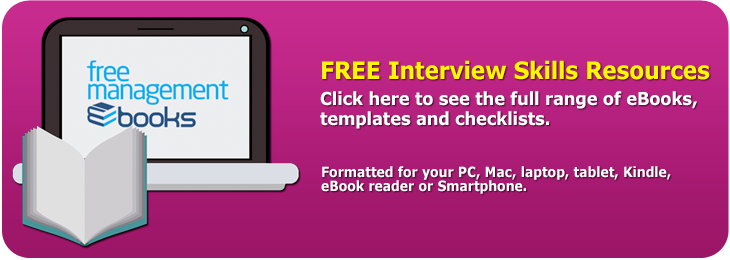Interview Behavior
Always remember that the interviewer is interested in what you can bring to the role and the organization. This means that you should only refer to things that you have done and can talk about in detail, and avoid talking about things that you were only peripherally involved with.
You should always use 'I' rather than 'we' when answering a question. Some people find this awkward because they are used to referring to themselves and their team as one entity in management meetings, and find 'we' more natural. Good answers usually begin with something like:
'I decided to…'
'My first step was to…'
'I set up a review of…'
'My personal responsibility was to…'
All of the examples you use to illustrate your answers should be specific and directly relevant to whatever is being asked. Clarify anything you are uncertain of; the interviewer would rather spend a few seconds rephrasing the question than listen to an irrelevant answer.
If you are struggling to think of an answer, it is always better to ask if you can come back to it later. Quite often, as you progress through the interview and become more relaxed, a good illustration of what was asked for comes to mind. Always be honest and don't try to make something up just to fill in the silence - answering the 'wrong' question can make you look like a poor listener.
An interviewer may say something deliberately provocative or something that they know you will disagree with in order to put you under pressure and to see how you react. This is actually a good thing and usually indicates that the interviewer is satisfied with the basics and is now trying to establish what you would be like to work with if you were involved in a disagreement over something. Candidates who have done well up to this point often let themselves down because they switch to agreeing with the interviewer without making sufficient effort to argue their point, or they take the matter personally and become confrontational.
The balance of power in an interview varies depending on economic climate and the supply of and demand for the skills being recruited. However, it is always best to assume that the power lies with the interviewer because they will usually see it this way and will resent any perceived challenge to it. This can become a problem if you have a fundamental difference of opinion with the interviewer, so you need to be careful if this happens.
If you disagree with something that the interviewer says, check your understanding first. Ask a question or questions to clarify their meaning as this demonstrates that you are keen to establish the precise facts, ahead of making your point.
Never become confrontational. Some questions are designed to see how you handle disagreement and, whilst you do not want to appear weak, neither do you want to be seen as a difficult person to work with.
If you are convinced that you are right and decide to stick to your point, do so in a way that is polite and courteous. This demonstrates that you do not see any major issue; you simply have different views. How you conduct yourself in the interview is how the interviewer will picture you behaving in the working environment.
The above points are valid for all types of interview, but confrontation in panel interviews is particularly difficult to handle because you are outnumbered. Generally speaking, once a confrontation starts then the panel members tend to band together because they are on one side of the table and you are on the other. Even panel members who are inclined to see things your way may prefer to remain silent rather than support you against the others on the panel. This means that in any sort of confrontation in a panel interview you will usually come off badly.
It is not unheard of for interviews to be conducted for intelligence gathering rather than to fill a position. If you are in a particularly competitive market this is something that you need to be aware of. Don't be afraid to say that you can't answer a question because it would be a breach of trust with your current employer. If the interview is legitimate then this won't count against you. In addition, do not be tempted to give out any commercially confidential information because it is illegal and could make you look disloyal to your present employer.
Sometimes the person interviewing you may not be very experienced and may actually be more nervous than you are. This is more common in preliminary interviews where the task has been outsourced or delegated to a junior member of staff. Although it can also happen when the person who is supposed to conduct the interview is suddenly unavailable.
If you find yourself being interviewed by someone who is inexperienced then you may need to help them out. For example, inexperienced interviewers often ask closed questions that you could answer with a 'yes' or 'no.' If this happens then take the initiative and give reasons for your answer even if this was not asked for explicitly. Just giving a one-word answer not only makes you sound offhand but it can fluster the interviewer, who may not realize that they are asking closed questions.
You may also be interested in:
Interview Questions | Interview Behavior | Capability Questions | Commitment Questions | Compatibility Questions | Questions About Your Self-Image | Questions About Your Application | Questions You Should Ask.


